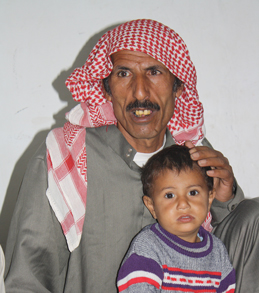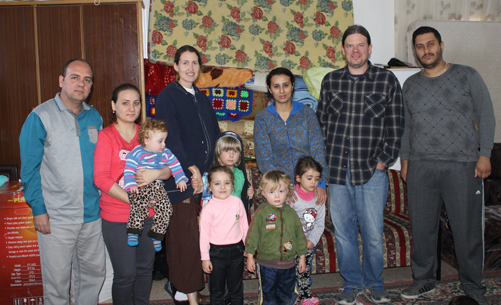By GARY ALLEY
December 2014
A group of three families, which included seven children six years old and under, went to Jordan Nov 15-16 to visit with Syrian and Iraqi refugees. The three families were JCF’s Eva and Danny Kopp, my family, and the Nazarene Church’s Shahade and Annabelle Twal. My wife, Sharon, had an impression that we should go as families, along with our young children, for two main reasons. One purpose was so that we as families could connect with their families on the most basic level—as fathers, mothers, brothers, and sisters. Our second intention was for all of us, including our children, to become more aware of the refugees’ dire circumstances. Ultimately, we went as followers of Jesus to let the families know that they had not been forgotten and there is hope.
Over the 36 hours that we were in Jordan, we visited with six families in Mafraq and Madaba. Our visits were graciously led by local Jordanian ministers of the Nazarene Church. It was exciting to experience different Christian ministries and denominations working together to face the enormous needs of the refugee crisis in Jordan. We could sense a true spirit of unity and grace among the Jordanian believers. Also encouraging was that every family that we visited readily agreed to pray with us.

After a quick lunch in Irbid, our first stop was Mafraq, a town close to the Syrian border and on the frontline of the refugee situation. We wanted to visit one of the noted refugee camps, either Za’atari or Azraq, but the camps can now only be visited with prior special permission. We quickly learned, though, that most of the Syrian refugees do not live in camps anyway but everywhere else in Jordan, whether in rented apartments or UN tents. Officially, Jordan has 640,000 refugees but officials say the true figure is double. That means that Jordan’s population has astoundingly increased by 20% in the last two years. Without necessary infrastructure and a healthy economy, Jordanian society has been under enormous pressure.
Due to high demand, rent prices have doubled and tripled. The refugees are not legally able to work, but many try because they have little to live on. At the least, the children beg. Most refugees had to leave all of their possessions and assets behind. Therefore, they are forced to try to subsist off of a monthly stipend from the United Nations. Refugees that we visited told us that, previously, they received $56 a month per person from the UN, but that has recently been cut to $34. Since our visit, the UN has recently suspended food stipends because of insufficient funds from donor nations. Needless to say, Jordan is at a breaking point, and the refugees are falling into the cracks.
In Mafraq, we first visited a children’s center of the Nazarene Church. On average, more than 70 Syrian children meet there weekly for a Bible lesson and fun. The meeting had just finished when we arrived Saturday afternoon, but there were still more than twenty children waiting for a ride home. We talked with them, took some pictures, and passed out some balloons. Next, we visited three Syrian families from Aleppo and Homs. Aleppo is an ancient and storied city, though with the Syrian Civil War it has become ground zero for battle and destruction. Homs, is also a historic location, but it is more well-known now as the “capital of the Syrian revolution,” because of an initial 2011 sit-in protest where tens of thousands gathered in the city’s main square to protest the Assad regime.
When entering at every home we visited, we took off our shoes, as custom, and left them at the front door. One family we visited was particularly poor. They had nine children and the wife was pregnant. The Nazarene Church had recently helped provide them with cushions for sitting on the floor. They had two sons with disabilities, as well as two daughters who had been injured and burned in Syria from the violence. Those two daughters were in a hospital in Jordan’s capital, Amman, being attended to by another sister. As we inflated balloons for their children, more and more kids from the neighborhood streamed into the house seeking a balloon as well.
After our visit, as we said our goodbyes while putting on our shoes, my 6-year old son, Sa’ar, noticed that his shoes were missing. Obviously, a neighborhood kid that had come in search of balloons had felt blessed to discover shoes his own size. The embarrassed father of the house brought out shoes that had been given to one of his children, pressing them upon us, but we told him that it was not a problem. As I carried my son out to the car, he asked if that family had money. We told him that before they fled Syria, they probably had land and other things, but now they had little. He then asked if we could give them some.
We spent the night in Madaba, another ancient site famous for a Byzantine church that has a 1400 year old mosaic floor map depicting Jerusalem and the Holy Land. The first families we met the following day were Iraqi Christians that were temporarily living at the Christian Missionary Alliance Church. We heard the story of Levon, who had grown up in Baghdad but, because of the growing violence against Christians there, had fled to Aleppo, Syria in 2006. There he tried to find avenues for religious asylum in a Western country. When the Syrian Civil War broke out in 2011, he returned to Baghdad. As the violence against Christians continued in Baghdad, he along with other Iraqi Christians, found his way north to Qaraqosh, the largest Christian city in Iraq. For Bible readers, Qaraqosh is near Nineveh, the Assyrian capital, where the prophet Jonah preached to the Ninevites.

In August of this year, Qaraqosh was overrun by ISIS, causing a massive exodus of Christian refugees. Levon and his family fled back to Baghdad. With the continued danger for Christians in Baghdad, they have now found temporary safety in Jordan but are seeking asylum in the West. More than 5,000 Iraqi Christians have recently found a respite in Jordan while facing their uncertain futures. Besides all the bureaucratic paperwork, visa applications to Western countries can cost thousands of dollars, of which most do not have. As we sat talking with our Iraqi Christian brethren, all their few life belongings were splayed out behind us in suitcases and a pile of random bags. After all of his dangerous escapes over the last years, Levon emphatically told us, he and his family could no longer live in the Middle East.
After we prayed with them, we exchanged contact information. When Levon saw my Facebook profile picture which had the Arabic letter “nun,” he asked me if I knew what that meant. (Note: When ISIS has invaded towns it marked the homes of Christians by spraying the letter “nun” on the outside. “Nun” is the first letter for Christian or Nazarene.) I told him, yes, and there are many others like us who are praying for them and seeking to help them.
The last family we visited was from Syria. They had three small girls who were given three boxes from Samaritan’s Purse Operation Christmas Child. The wife had seen her brother killed in front of her and suffers from Post-Traumatic Stress Disorder (PTSD). Her husband also was diagnosed with PTSD and had had 40 members of his family killed. Both are taking prescribed medication. At the end, we prayed over the mother and our spirits groaned with her bottomless burden.
It seems the world has been quite full of bad news lately. Ebola has ravaged West Africa with over 6,000 dead to date; Eastern Europe shivers under the shadow of a resurgent Cold War Russia; Hong Kong fears its future freedoms are fading; Nigeria is bleeding daily under the Islamicist terror of Boko Haram; not to mention, Israel stands again at an uncertain political crossroads in the wave of recent violence and bloodshed. Not just globally, but locally, we all have our own problems, from chronic health issues to broken down cars. It is only natural to worry about our own needs first.
Yet, the Syrian Civil War has now claimed more than 200,000 lives. Over 3 million refugees have fled the country and nearly half of all Syrians (6.5 million) are displaced within their own country. Last week U.N. Deputy Secretary-General Jan Eliasson issued an appeal for $1 from every person to help the Syrian refugees. Eliasson said requests from around the world for humanitarian help have risen nearly 600 percent in the past decade, from $3 billion to $17.9 billion, but the funds from donors and nations have not kept pace.
Turning away from the request of a beggar or the needs a stranded refugee, it is easy to use Jesus’ words, “The poor you will always have with you but you will not always have me” as justification for our inaction (Mt 26:11). But Jesus was quoting Dt 15:11. Like a good Jewish teacher, when Jesus quoted part of a verse, his ancient listeners knew he was alluding to the entire verse—“The poor will always be in the land; therefore, I am commanding you to make sure you open your hand to your brothers who are needy and poor in your land.”
Our visit to the Syrian and Iraqi refugees showed us how much we have been blessed with, how much we can be thankful for—shelter, clean water, food, and, especially, shoes. Since our visit, our children voluntarily pray for the families we met and the countless families we did not meet. The fighting continues in Syria and Iraq with no end in sight, but that apparent senselessness and hopelessness does not release us from helping. Read the Bible; we cannot escape God’s instructions—we are commanded to help. We must open our hands.
If you would like to donate towards JCF's work with the Syrian and Iraqi refugees in Jordan, go to our Donate page.
![]()
